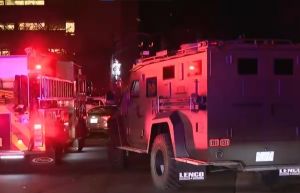After getting off the phone with incoming President Donald Trump, Russian leader Vladimir Putin is back to his old ways. This time, major offensive airstrikes ensue in the Syrian provinces of Homs and Idlib.
In addition to the firing of cruise missiles, the aircraft carrier Admiral Kuznetsov has also launched fighter jets in the operation.
With Washington still in transition, Moscow has taken America's turnover period into an opportunity as it continues to reinforce its campaign against Syrian rebel forces. Earlier, the discussion between the former Cold War foes tackles about the necessity of joint actions against international terrorism.
True to what has just been deliberated, Putin immediately seizes the initiative to mount aerial assaults against insurgent fighters who had been considered extremists both by the Al-Assad regime and the Kremlin.
In a meeting with Putin and Russian defense contractors, Defense Minister Sergey Shoigu quips that an extensive operation has been unleashed against the Islamic State (IS) and the Jabhat Al-Nusra (JAN) factions.
Syrian government forces, meanwhile, back Moscow's declarations, stating that rebel-held positions in Aleppo had been hit. The airstrikes end the ceasefire in the area.
Meanwhile, the Syrian Observatory for Human Rights (SOHR) has noted the perilous disturbance the airstrikes made in the region.
Republican Senator John McCain from Arizona, who is the Chairman of the Senate's Armed Services Committee, has sharply criticized the ensuing Russian attacks. He lambasts Putin for cooperating with President Bashar Al-Assad's war against the Syrian masses.
Prior to the assaults, US Secretary of State John Kerry has pointed out to Russian Foreign Minister Sergey Lavrov in a discussion that addressing the Syrian conflict needs a political approach.
According to Shoigu, the aerial attacks are aimed at terrorist facilities where trainings are done and WMDs are produced.
On the other hand, the United Nation's (UN) World Food Program that food supply inside Syria is low. Aside from the distressful security situation, the hostile weather conditions have made it difficult to gain access to farming and market resources.
© 2025 HNGN, All rights reserved. Do not reproduce without permission.








